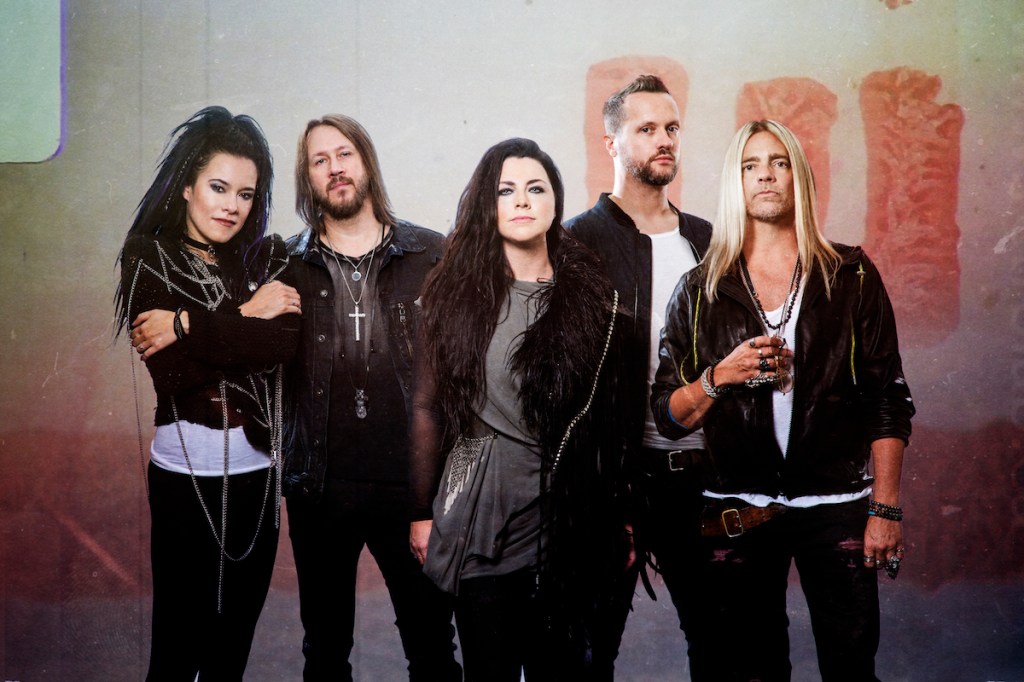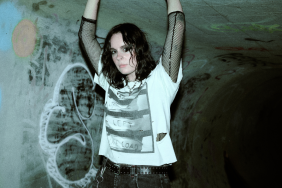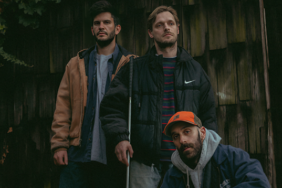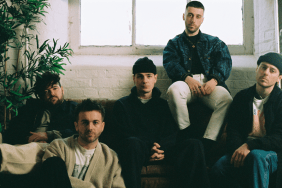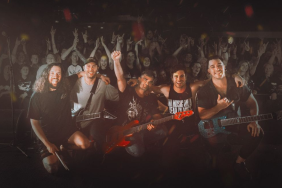When Evanescence released their mega-selling debut album Fallen in 2003, it thrust vocalist/pianist Amy Lee under the brightest of spotlights. One of the criminally few female voices given mainstream attention amidst the nu-metal explosion, Lee became a symbol of hope and inspiration for many aspiring rockers. Selling over 17 million units, Fallen was home to modern radio rock staples ‘Bring Me To Life’, ‘Going Under’ and ‘My Immortal’ three songs that remain almost inescapable today. In the years following Lee and a revolving door of Evanesence bandmates produced two more commercially successful studio albums, before exiting for a seemingly indefinite hiatus. After returning to live stages in 2015, Evanescence brought the ambitious Synthesis, an orchestral and electronica reworking of a selection of songs from their catalogue, embarking on a worldwide tour in this format, to the adoration of fans.
Now, more than a decade since their last original output, Evanescence have returned with The Bitter Truth their most sonically explorative and honest record to date. Written, recorded and promoted amidst the constantly changing COVID-19 hellscape, The Bitter Truth sees Lee and company tackle both the personal and, perhaps surprisingly to some; the political, embracing a new level of confidence, maturity and self-assuredness. Released at a time when the heavy music industry is finally giving female and femme-identifying voices the platform they’ve always deserved, many of whom turn up on single ‘Use Your Voice’, The Bitter Truth looks set to invigorate and inspire a new generation of Evanescence fans.
In the days following the release of the album, we caught up with the icon, Amy Lee herself, for an early morning chat about Evanescence’s legacy, the creative process, adaptability, the evolving status of women in heavy music, the band’s distinctive aesthetic and of course, all things, The Bitter Truth.
Music Feeds: Amy, thanks for taking the time to talk to Music Feeds. We’re particularly excited to talk to you at the moment because you have a brand new album out. How is existence treating you?
Amy Lee: Awesome. Thank you for taking the time to talk to me too. We are all just SO happy to finally have it out there! It feels really good.
MF: It’s quite a sonic adventure, this record. It presents all of the elements that people are accustomed to hearing from Evanescence and blends them with a whole bunch of new elements, was this a fun and rewarding record to write for you?
AL: It’s hard to sum it up in a word like fun because it is, it is so deep. There was definitely pain involved and challenge and all those things that lead to making something great, you know? It takes a little bit of struggle and we went through a lot to get to the place where we could write this album. I think the word that sums it up is satisfying. It feels really good to get a lot of this off of my chest. For me, this is partially due to having things to say that had been building for a while and having a new perspective to write from, but also musically, with the band, it shows how far we have come as a band and displays what it is that these guys and lady, that I work with now bring to the sound and that connection deserves to be documented. I really wanted a chance to show what we’ve grown into and it feels really good to listen to that back.
I think everybody’s feeling excited for the eventual day that we get to go play this stuff live again because for so long, our live show has been about making a great collection of our big back catalogue of music, but it’s all old, you know? It’s been a while since we’ve been able to really go, okay, “this is who we are now”. So having this now it’s going to be hard to play anything, but the new songs.
MF: I’d imagine it would be, especially given how much of yourself that you’ve put into the record. Now I know that you all went through a lot of challenges, both personally and as a band in the writing process, with some personal tragedies, the pandemic and even having one member stuck indefinitely in Germany, do you feel like those challenges added to the emotional intensity of the record?
AL: Yeah, I think that’s a good way to put it. It made everything more important. The music has been like this life-giving thing for us all to grab onto and to connect us to each other. As people, we’ve been so isolated, so expressing yourself and being able to share in that with somebody far away, makes it feel like we’re not so far away, on an internal, on a soul level, you know, we are connected. It has been so healthy for all of us to be able to pull together and have something to work for, something to fight for and build a world that we can control.
That’s something we all want so bad in a time when it just has felt like so much is out of control. So I think for us, to have this thing to care about and to focus on, has just been such a gift. I don’t know what I would’ve done without it quite honestly, I think it would have really gone insane.
MF: All of these situations also made you have to be pretty innovative in order to complete the record, finishing songs and sessions for the album remotely and thinking your way around how to be a band, without ever really being in the same room. In a strange way did that challenge make the writing and recording process feel like a fresher and more interesting experience? Do you feel that adaptiveness and creativity added something extra to the record?
AL: Absolutely, I really do. I’m a believer in that. I really, really, really liked breaking rules, especially when it comes to creativity. I like making music, making art; to feel like making art, it needs to feel creative and inspired and excited. When we were making our first music, when I was writing Fallen, I didn’t know what I was doing. I didn’t have anything to live up to, or I didn’t have a method that I could rely on. It was just creating a way for the first time. The more that I think you can tap into that, where it feels like you’re just, a soul scratching at something trying to make it come to life, the better the art will be.
You can be surprised by how many different ways that can happen. I was pushing us in a little bit of that direction with Synthesis, making the band kind of find a new way to play their instruments, where it would fit into an orchestral setting without heavy guitars and big drums or anything that sounded like those acoustic instruments, pushing them to find a new way. Jen learned how to play the theremin a little bit and made that a part of her thing. I learned to play the harp a little over ten years ago, I’m a piano player and they’re related, I mean, a harp is the guts of a piano, but it’s being plucked. So there are similarities, it’s sort of like French to Latin or something but different, it makes you play differently, and I wrote songs during that time on the harp a little bit, because it forced me to play differently. It made me write differently also and because of that, we got songs that weren’t like the way they would be, if wrote them with a piano as my route, like I typically do.
I think it’s really good to work outside your comfort zone and outside the box and to be challenged, it makes it exciting too. I don’t want it to feel like a job. I want it to feel like the fun thing. I want it to feel like the secret project because that’s how it should be. Right? Like your job is your job, that’s the cubicle that’s filling out paperwork and doing your taxes to be a musician. To be a creator, to be an artist, that should be the thing that feels like your freedom, your release, the thing you’ll stay up all night for, not the thing that you’re supposed to do.
MF: That’s a very empowering message and an inspiring message to give people too and I feel like you can hear that fresh inspiration on the record.
AL: Good! You know, having to, having to think around the problems, this time a lot of it’s been about the promo. We did get to get back together and be in the studio, all of us, except Jen, last fall and do things in a fairly typical way, which was amazing, but it was more humble like we were eating ramen and stuff so that we wouldn’t have to do takeout a lot of the time. Everything was a little bit more like early days, which felt good. It made it feel like we’re doing this because we love this, not just because it’s a cushy job. Having to think about making our own music videos or even this right now, like setting up the stuff where I have to film myself, that’s a new experience.
We even did Jimmy Kimmel recently, and they essentially said, “do it yourself, figure it out and send it in, and we’ll put it on the air.” It’s like, Oh my God, well, we’re all over the world, but we don’t want to pass up this opportunity. So you just have to find a new way and it’s amazing, the feeling that you can get at the end of that after you do it, the empowering feeling that really does give you like, “Hey, I did it, I did it!”. It means something to know that I cared about it enough that I tried and I made it happen and in the process, I’ve learned a new skill.
MF: You learned a lot of new skills in the process, especially when you’re talking about the videos, the fact that you shot two video clips on your iPhones… did you ever think that would be possible? And was it hard to get into the performative headspace to make that look as organic and as awesome as it does?
AL: It was really fun! It’s hard to explain it, but it really reminds me of being in high school and having a dream and doing whatever I could with what I had to make it happen. Once we got the idea we realised that it’s not like we’re going to be able to do production, so let’s make it about the soul, let’s make it about the point and the heart of the message and see if we can get that across and let that be the leading thing. That’s been sort of the guiding mantra about this whole time through last year and in the process too, has been: let the meanings lead, not the tempo, not the style. Whether it is deciding which songs come first, or what’s going to be a single, all those things really have come about this time by answering the question of “What’s the message we want to convey? What are the words we want to speak into the world right now?” Because this music, as much as it is for us, it’s more than ever feeling like it’s for everybody. So what, where are we now? And what, what could the world, you know, relate to or need?
MF: The messages on the record, are particularly strong. The obvious one is ‘Use My Voice’ but overall it seems like a record with quite a lot to say, and I feel like that might differentiate it from what people might have come to expect when it comes to lyrical content from Evanescence. Is your focus as a musician and as a strong voice in the community to just say what you mean now? Was there ever a point in your career when you felt prevented from doing that?
AL: I think the biggest preventer of things like that is my own self. The music for me has truly, always been the one place where I tell the truth, not that I’m a liar in real life, but the music is the one place where I’m not holding back from saying what I really mean. The one place where I’m not just keeping my mouth shut because I don’t want to deal with the fallout. So whether or not that’s always come across clearly, because I have been vaguer in the past with the lyrics, I’m not sure. But if you knew my situation and you knew who I was talking about at the time, it would have been a lot more clear.
It’s funny because we’re on a level now, where it’s not just me and my family and my friends who know me, it is about something bigger on some of these tracks and ‘Use My Voice’ is definitely the biggest one that is that way. That’s coming from me, pushing myself. I have been really pushing myself over the years on every album and challenging myself to be more specific and to say what I really mean because it feels good. The more that I can really let off, the more of a release it is for me to let some of those things go. It felt good and felt like, there was a higher purpose with ‘Use My Voice’ because we knew that we were going to be able to use it, to empower other people, and make positive change in our country and in the world, in the fight for democracy. It’s so important. It’s huge. If rock can’t be the voice for power to the people, then I don’t know what we have to do that? That’s our job!
MF: That is awesome. It’s also good to hear to an extent that you feel like it was always you that has been holding yourself back, and that you’ve grown through that, rather than it being a case of industry folk, holding those elements back. Because I think there’s a bit of a belief in the music industry that particularly at the start circa Fallen, that people wanted you to be something that you’re not. Those people around you were trying to force you into becoming Linkin Park or something?
AL: That’s actually true, that part, but I still wrote about all of that, I still wrote those lyrics. So I guess that was the start of me pushing myself.
MF: It seems that you were a bit of a trailblazer in the modern heavy scene, in many ways. When Fallen blew up it inspired a generation of new performers and it seemed to also open industry eyes to what female and femme-identifying acts could bring to that space. With this in mind, it would be remiss of me not to ask how you feel about the state of the industry at the moment in terms of its attitude towards the female and femme-identifying artists in the heavy scene?
AL: That’s the question, isn’t it? It’s not about women not being allowed to be musicians. They always have been. It’s about how we see the summary. So often rock these days is not in the mainstream. It’s boiled down to a teeny, teeny, tiny piece of the pie, and there’s only room for one face, and it’s a picture of a dude. Because that’s how people that are not rock fans see the genre. People that are rock fans know that rock music has never gone away, that it has legions of fans and thousands of fresh acts and perspectives, but whether or not these big mainstream gatekeepers are going to let that through, and show that as reality, is a different thing altogether. I think to an extent that people who don’t know a lot about modern rock music, still see it as a picture of something ancient, like an artefact of when they were kids. They still see it like Bruce Springsteen, or The Beatles, or these other depictions of old rock bands, when the truth as you know is that it has changed so much since then.
I do think that they’re making an effort now, I’m seeing an effort being made. I mean this last Grammys was all women in the rock category, In This Moment was up for the metal award, and I know that it’s not just about the Grammys, but it’s good to see that happening. I think that the world, our society is aware that this is a moment for different perspectives to have a chance to show their face and to shine and to say, “Hey, here’s, here’s something from my perspective”. I think that’s really, really important that we all are able to kind of see things through more perspectives than just our own. I think that is really the road to helping a lot of the issues in our world, in our society. Not thinking only from your little perspective of you and your hometown and what you’ve seen, and there’s a lot more out there and it doesn’t need to be scary. We just need to be exposed to all kinds of differences. It’s happening. Rock is definitely a place for all things, all people, you know. But it’s just gonna take time, you know, for that picture to change, when all it boils down to a summary, they need to stop summarizing so much. I will say as well, rock music is huge. There’s so much of it. We need a little more air time, please!
MF: Yes, yes, yes, definitely. Definitely more time, more perspectives, more diversity, more respect, more rock! I’m actually a rock singer myself. So I’m just sitting here nodding thinking that it would be lovely to be considered a worthwhile genre again, in a mainstream sense. Now, I do want to know something about you as a person, Amy. The band has a very distinctive, visual aesthetic and I’ve always wanted to know if that’s something that’s inspired by your tastes, the other things in life that you enjoy, or if it is just something that fits the music?
AL: That’s an interesting question. I feel like it’s both. I’ve always had a huge interest in the visual. It is essentially important to me and I always have ideas like when the songs are happening, when I’m making music when we’re in our world of creating, I’m constantly just seeing things in my head and thinking about ideas about how to bring the song to life with visuals. I’ll sit there thinking “ooh if we do a video, I need to see this happening” you know? Or, for example, with the clothing you see me in, I designed my own clothes. So a lot of the time what I wear either on stage or in music videos, I’ve made specifically for that purpose. It’s about being able to create a whole world and have a visual representation of who you are from the production too, on stage, it’s so important, it makes all the difference. It’s honestly, you understanding and accepting and putting out there a further dimension of what you are for people to tap into and to get and to relate to and perceive.
It’s hugely important to me, but it has to do with the music. You can currently see toys against a white wall, on a couch, in my house, so you can tell that my house is not entirely full of like black wallpaper and chains, if that’s what anyone was expecting. But I wouldn’t say that Evanescence aesthetic is straight-up metal either. It’s more complex than that. So it’s the side of me that is that trying to summarize the music in a way, in a visual mode, where it’s kind of like got some Victorian elements that represent the classical for me, and it’s got weird atmospheric things that kind of represent the electronic world, and of course it’s got the distressed elements and the darkness and the heavy feeling of the band. The more layers you can use to express yourself, the better.
MF: That makes a whole lot of sense. I honestly hadn’t connected the Victorian imagery and the classical music background before, but it absolutely makes sense to me now. Speaking of visual arts, you’re doing a very cool thing within that spectrum on this record, by releasing a graphic novel anthology that’s inspired by Evanescence music. How did that come about? And as a lover of the medium, that must be the most awesome thing ever, right?
AL: It’s so awesome. It’s so awesome! I have all these really grand ideas that would take way too much time and energy to actually do, while also doing my music career and being a mum and everything else that goes on in life, but this is something that I’m able to do because it’s coming from heavy metal. They came to me and were like, “Hey, we’d like to do this with you”, so instead of me having to find artists and put all this stuff together and create this world, they’re like, “Hey, we got it, we have the coolest, the best graphic design artists in our works in our sphere and the best story writers and stuff, and we want to do something based on your music”. So they came to me about a year ago and it sounded like one of those ideas that are too good to be true, where I was saying, “I’m in, now let’s see if this is just a bunch of meetings or it’s really going to happen” and it’s really happening!
The first two songs are in the works right now, it’s just so cool. I want to make this clear to our fans, it’s not my idea and my inspiration of the meanings behind the songs, presented as a visual. This is different artists and different writers for each song, getting an idea and being inspired while listening to the song and turning that inspiration into a beautiful graphic novel, based on their individual interpretation of the song. It’s so cool because it lets the music just take on more forms, have more lives, more alternate realities. I love it!
MF: I look forward to looking at every single one of these! Have you seen any of the graphic novels yet?
AL: I have, I’ve seen some of the stuff already and it looks really cool and I’m very excited. I have a little hand in it, giving opinions like do this, don’t do that, but for the most part, this is other creatives, just taking it to another place. It feels really good to see that happen.
MF: That’s so awesome. I’ve got to let you go, so thank you for talking to Music Feeds. I must confess that as a heavy music-obsessed teenager when Fallen dropped, I was all about it, so it’s great to see and hear you and Evanescence in such a great place as you’re putting The Bitter Truth out into the world.
AL: Thank you, that’s lovely to hear. It’s good to be back! It’s been nice talking to you, thanks for taking the time.
–
‘The Bitter Truth’ is out now. Evanescence have announced a free Livestream gig, dubbed ‘Driven to Perform’, which will see them performing songs from the newly-released album plus favourites from their back catalogue. The virtual performance will take place next month on Friday, 14th May at 11 am AEST, and will be hosted by none other than Alice Cooper.
